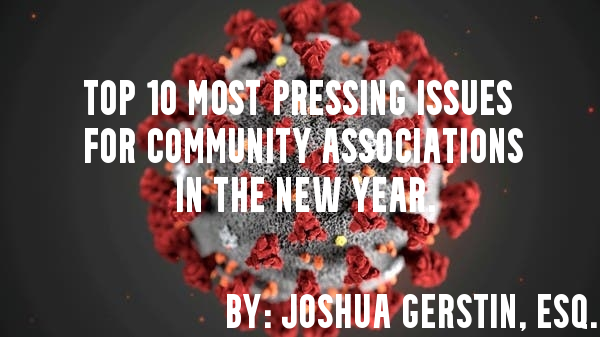
As The State of Florida emerges from the COVID-19 pandemic, the year 2020 will live on in infamy. During the past year of sadness, chaos, and hope many trends emerged that are likely to stay with us long after COVID-19 is gone. Some of these trends, such as increased communication and video conferencing, will be welcome. Other trends, such as the need for increased collection efforts and renewed leasing and sales restrictions, may not be as welcome. Following are the top ten most pressing issues for community associations in the new year.
1. ZOOM Meetings for Members. For most community associations, offering a video conferencing option for the members to participate in a Board meeting or count towards a quorum in member meetings after the emergency declarations are lifted will require the promulgation of well-drafted Rules. For some community associations, the more arduous process of amending the declaration or by-laws may be required.
2. ZOOM Meetings for Directors. In addition to members participating in board meetings via video conferencing, directors may want to participate via videoconferencing as well. Allowing directors to participate via video conference after the emergency declarations are lifted will require a thorough review of a community association’s governing documents. A quorum of the board attending board meetings via video conferencing after the emergency declaration subsides will most likely not survive a challenge.
3. Recording ZOOM Meetings. If a ZOOM meeting is recorded, the recording is an Official Record likely requiring the Association to make the recording available to others to watch for the next seven years. Deciding not to record video conference meetings inevitably causes the loss of evidence necessary to confirm a quorum if challenged. Consider establishing a video conference recording policy.
4. Mandating Vaccines for Common Area Access. Can a community association mandate proof of COVID-19 vaccination before allowing members or their guests access to common areas?
5. Working from Home or Running a Home-Based in Community Associations. The pandemic normalized working from home and in many instances newly laid-off workers are starting home-based businesses. Working from home is different from having a home-based business with pickup, deliveries, and the occasional customer. However, most governing documents do not recognize the difference between the two, rendering most existing work at home/ home-based business restrictions useless.
6. The Mass Yankee Migration, Leasing & Sales Restrictions. The pandemic amplified an already existing trend, more people are moving to Florida than ever before. Many community associations recently made an unsettling discovery, their leasing and sales restrictions enforced for years are either outdated or do not exist at all! Fair Housing Act complaints are brutally expensive and may not be covered by your community’s insurance. Check and validate your leasing and sales restrictions before it is too late.
7. Getting Involved in Neighbor v. Neighbor Disputes. As the pandemic raged, so did people’s tempers. Community associations that misunderstood their role and scope of authority are now finding themselves spending time and money handling neighbor v. neighbor disputes. To avoid unnecessary liability and the wasting of precious resources, community associations need to know “when to hold and when to fold em’”.
8. Increased Collection, Bankruptcies, and Foreclosures. The financial strain of the pandemic will be felt throughout community associations long after the pandemic is over. Many community associations have out-of-date collection policies. Other community associations improperly “follow their gut” or make up rules as they go. Community associations need to examine their collection policies now. Lawsuits over improper collection activity are expensive and damaging. Community associations can be compassionate, while at the same time avoid costly deficits.
9. Governing Document Enforcement. Many community associations were lax in enforcing their governing documents as the pandemic raged. Finding a kindly, gentler way to now enforce your governing documents before it is too late and your community’s restrictions are “waived” and lost forever is vital for many community associations.
10. Pets, Pets & More Pets. During the pandemic pet adoptions skyrocketed. Many community associations found themselves without the ability to limit pets and have no system in place to track pets. Other community associations improperly allow or deny emotional support animals leading to increased liability.
One thing is known for certain, community associations that act proactively will be better positioned to meet their obligations in the year 2021. Form a committee, gather the Board, and call your association’s attorney, the time is now to plan ahead.
